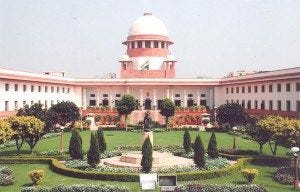Supreme Court to Govt: You have ONLY 4 months to decide on prosecution for Corruption Charges
A democracy has special checks and balances. One of the checks is the way one of the three branches of the Government – Executive, Legislative, and Judiciary – can make sure that the country is not been taken apart by the other two working in connivance.
In India’s case, Executive and Legislative branches are in cohoots with each other when it comes to corruption. When one looks the the political will and reaction across the spectrum in the Parliament – although BJP has made a fair amount of noise – then one will find the apathy is a political standard.
In a landmark judgment on Jan 31, 2012, Supreme Court has put the pressure on the Government, which it was trying to dodge by targeting the entire bunch from Baba Ramdev to Team Anna’s members. India’s Attorney General – using the same arrogant posture that Government (and politicians like Mulayam “Who are you to question us?”) – protested against Subramanian Swamy’s petition in 2G Scam to seek sanction of prosecution of ex-Telecom Minister A Raja and said that Swamy had “no locus standi” to seek such prosecution.
Who is Baba Ramde to question on Corruption? Who is Anna Hazare to question? Who the heck is Arvind Kejriwal or Kiran Bedi?
For anyone listening, one can listen to the Government shouting in every Citizen’s face – “We will Rape and Plunder you!! Who the Heck are YOU to queston us?”
As for this case, the a bench of Justices G S Singhvi and and A K Ganguly completely rejected the argument of attorney general G E Vahanvati in their verdict saying:
“There is no provision either in the 1988 Act (Prevention of Corruption Act) or the Code of Criminal Procedure, 1973 (CrPC) which bars a citizen from filing a complaint for prosecution of a public servant who is alleged to have committed an offence.”
Also, court didn’t like the argument of Attorney General that issue of sanction for prosecution of a public servant can come up only when the court takes cognizance of the case. So, it further said:
“The argument of the attorney general that the question of granting sanction for prosecution of a public servant charged with an offence under the Prevention of Corruption Act, 1988 arises only at the stage of taking cognizance and not before that is neither supported by the plain language of the section nor the judicial precedents relied upon by him.”
And finally, the court prescribed FOUR MONTHS TIME LIMIT for moving ahead with the sanction to prosecute. If the Government didn’t move ahead with the sanction within 4 months, then sanction would have been deemed to have been granted.
“At the end of the extended period of time limit, if no decision is taken, sanction will be deemed to have been granted to the proposal for prosecution, and the prosecuting agency or the private complainant will proceed to file the chargesheet/complaint in the court to commence prosecution within 15 days of the expiry of the aforementioned time limit,” Justice Singhvi said.
Interestingly, both the justices wrote separate orders, and Justice Ganguly was even more aggressive.
In his separate order, Justice Ganguly concurred with Justice Singhvi for laying down a time-limit for deciding sanctions. He said petitions seeking sanction must be decided within three months, but added that “an extension of one month period may be allowed to seek the opinion of attorney general and solicitor general at the Centre and advocate general in states if the process has been started in 3 months”.




